Move-In Green
Volunteering
Move-In Green is your chance to help shape a more sustainable Penn – starting the moment new students arrive. As a volunteer, you’ll welcome incoming students and families, share information about Penn’s green initiatives, and provide hands-on recycling support during Move-In. It’s one of the first – and most impactful – ways students can get involved with Penn Sustainability.
You’ll staff info tables at high-traffic locations like Houston Hall, the Quad, and College Houses, help students learn how to recycle properly, and promote opportunities to live and learn sustainably on campus.
This is a unique opportunity to connect with peers, meet staff, build leadership skills, and play a visible role in Penn’s sustainability story.
2025 Dates
- Monday, August 18: Training (4 hours)
- Tuesday & Wednesday, August 19-20: Volunteer Shifts (9:00am-5:00pm)
Who Can Volunteer?
Any undergraduate student entering their 2nd, 3rd, or 4th year is welcome and encouraged to apply to volunteer. First-years are encouraged to connect with Move-In Green volunteers during Move-In and get involved in other sustainability initiatives later in the year.
What You’ll Do
- Attend a 4-hour training session with the Move-In Green team
- Staff outreach tables during Move-In
- Educate students about Penn’s recycling system and sustainability programs
- Provide in-the-moment recycling assistance in College Houses
Minimum commitment: 20 hours (including training)
Why Join?
- Free early move-in to your College House
- Free meals (breakfast and lunch on shift days and lunch on training day)
- A free Penn Sustainability t-shirt
- Leadership and outreach experience
- Work with a passionate team of students and staff
Apply now to Volunteer for Move-In Green 2025
Questions?
Contact Noah Swistak, Sustainability Manager, at swistak@upenn.edu.
Move-In Green is a fun, fast-paced volunteer program that helps new and returning students make sustainable choices from day one. As a Move-In Green volunteer, you'll be part of a high-energy team that sets the tone for a greener campus during one of the most significant events of the year – Move-In.
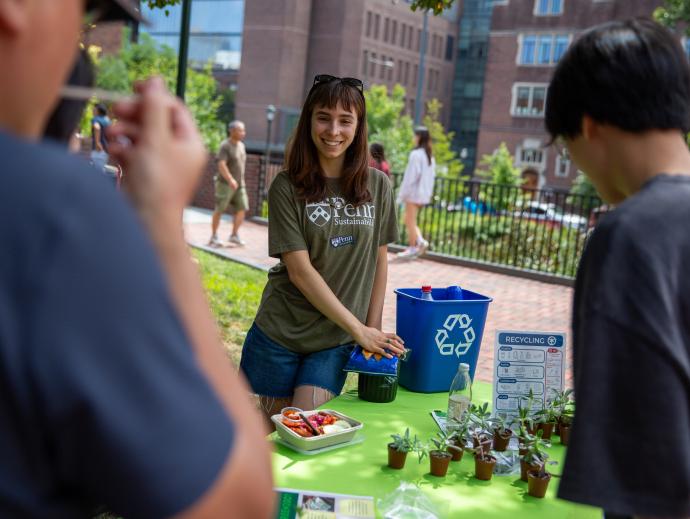
Welcome new students to Penn while promoting sustainable living and responsible recycling.
Staff info tables, help with recycling, talk to students about sustainability, and support campus-wide green efforts during Move-In.
Earth Week

Earth Week at Penn is taking place April 21 - 27, 2025. Earth Week presents an opportunity for students, faculty, and staff to engage in cross-disciplinary events designed to educate and inspire action. This year’s theme is Our Power, Our Planet – to inspire us to use our influence and energy to foster sustainability, environmental stewardship, and positive change. Earth Week elevates our collective impact by encouraging involvement from all schools and centers at Penn. For more information about serving on Penn’s Earth Week Steering Committee, please contact Noah Swistak, Sustainability Manager, at swistak@upenn.edu.
Interested in hosting an event during Earth Week? Students, faculty and staff across Penn are welcome to host an event. Those hosting events are encouraged to use the Earth Week logos and graphics in communications materials, and to submit events to the Earth Week calendar.
Earth Week happens every April during the week of Earth Day and presents cross-disciplinary events to educate and inspire action around environmental justice, climate, and nature-based solutions.
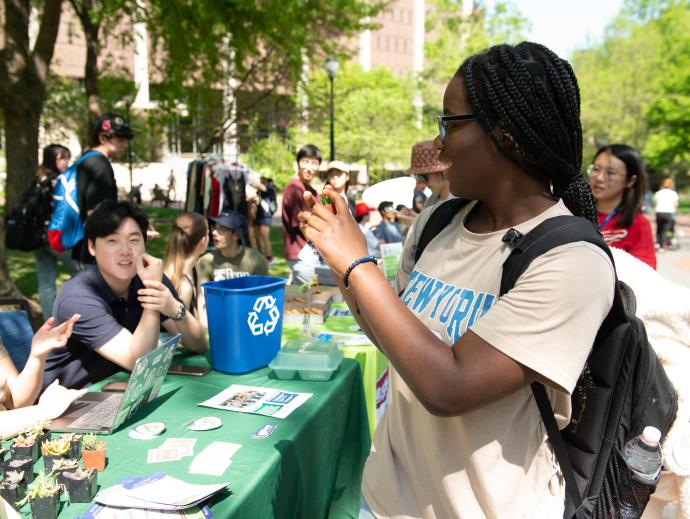
Anna Balfanz
Anna Balfanz
Anna is the Sustainability Coordinator in the University of Pennsylvania Sustainability Office. The Sustainability Coordinator focuses on outreach programs and works to embed sustainability practices throughout the student experience at Penn. The Coordinator manages programs such as Green Living, Green Office, Civic Sustainability Fellows, and the Penn Employee Alliance for Climate & Environment. The Coordinator also supports the office with communication, including maintaining Penn Sustainability’s website and managing its social media.
Previously, Anna worked at Penn’s Netter Center for Community Partnerships. As an Emerson Fellow, she developed and oversaw environmental justice partnerships between the University and local K-12 schools. In her role as the Academically Based Community Service Research and Program Coordinator, she supported university-community partnerships embedded in courses and research initiatives. She also interned in the U.S. Green Building Council where she developed educational materials on LEED certification for diverse audiences. Anna holds a B.A. in Environmental Studies with a concentration in Environmental and Sustainability Management from the University of Pennsylvania and is currently pursuing her Master’s of Public Administration from the University of Pennsylvania’s Fels School of Government. Anna lives in Philadelphia and loves rock climbing, thrifting, reading, and spending time with her communities.
Off-campus Move Out
Off-campus UPenn students between 40th and 43rd streets, and Baltimore and Chestnut streets, can now schedule a free curbside pickup from May 16th through May 31st for their gently used items. That means two professional movers and a box truck will come directly to your door to haul your donations away—no heavy lifting, no logistics, no stress.
Your donations don’t just disappear. Furniture gets redistributed to support local families throughout Philadelphia. Clothing and electronics are reused or responsibly recycled. And every item you give helps keep these items out of landfills while supporting our neighbors in Philadelphia.
How to Donate
· Schedule your pickup for your donation
· Leave your items outside on your scheduled day
· Feel great knowing you made a difference!
Click here to schedule your donation!
Curbside Bulk Trash Removal
For items that cannot be donated, Penn provides an additional day of curbside trash pick-up every Friday in May between 40th to 43rd Street, Chestnut Street to Baltimore Ave. Please bag your unwanted items and place them neatly outside your residence for collection by 10 AM. Please be aware, the city has added a second pick-up day to its regular pick-up schedule throughout May, so you will have three pick-up options each week.
42nd Street Road Closure
The 42nd street road closure between Spruce and Baltimore currently prevents trash, recycling, and donation trucks from accessing curbside collections. Those impacted by this closure may bring materials to be collected to the closest corner.
Penn Sustainability is working to improve the off-campus move out experience by reducing neighborhood litter and increasing access to donation options for Penn students. With support from the Office of Social Equity & Community, Facilities and Real Estate Services, and the Office of Community & Government Affairs, we’ve made donating your unwanted items easy this year! Working with Rego and the Philadelphia Furniture Bank, you can arrange for free curbside pick-up May 16-31. They are accepting furniture of all sizes, kitchen items, clothing, and more.
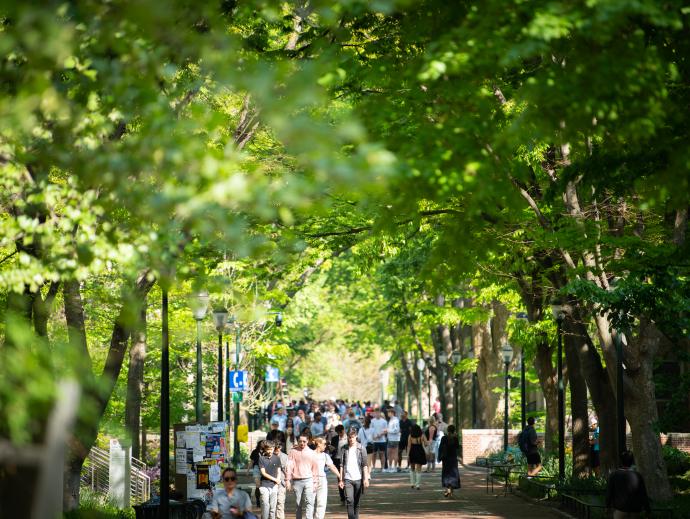
A Cleaner, Greener move out experience
- Free curbside donation collection: May 16th-May 31st
Curbside bulk trash pickup every Monday, Wednesday, and Friday* May 9th-30th
* Friday collections: No household trash will be picked up on Fridays, only bulk trash (mattresses, broken furniture, etc.) Place all items neatly by the curb by 10 AM.
Alisha Ramirez
Alisha Ramirez
Alisha is the Sustainable Labs Manager in the University of Pennsylvania’s offices of Sustainability and Environmental Health and Radiation Safety. The structure of this role allows Alisha to work at the intersection of laboratory safety and environmental sustainability. She oversees the Green Labs Program at Penn, coordinates events like the annual freezer challenge, and facilitates both the Green Labs Executive Committee and Green Labs Working Group.
Previously, Alisha worked in regulated laboratory spaces. She has worked in biotechnology labs as a lab resources manager and quality assurance associate. Prior to that, Alisha was the supervisor in a wastewater treatment laboratory regulated by the PA DEP and EPA. Alisha holds a B.S. in Environmental Biology from Salem State University and is a candidate in Penn’s Master of Environmental Studies program with a concentration in Environmental Biology. Alisha lives in Philadelphia and volunteers with wildlife surveys at the John Heinz National Wildlife Refuge.
Greenhouse Gas Data Dashboard
Greenhouse Gas Data Dashboard
Welcome to our Greenhouse Gas Data Dashboard, a comprehensive tool designed to provide insights into Penn's complex inventory of greenhouse gas emissions. As we navigate the challenges of climate change, understanding and monitoring greenhouse gas emissions is paramount to developing effective mitigation strategies. Our dashboard offers a user-friendly interface, bringing together data from various sources to offer a holistic view of greenhouse gas emissions across different scopes and categories. Whether you're a student, researcher, or concerned citizen, this platform serves as a valuable resource for exploring trends, identifying hotspots, and tracking progress towards a carbon-neutral university. Join us as we delve into the data driving our understanding of climate change and work towards a greener, healthier planet for generations to come.
Our dashboard showcases the annual greenhouse gas emissions of Penn for fiscal years 2009-2024. Penn's fiscal year spans from July 1 to June 30. The dashboard presents both gross emissions, which represent the total greenhouse gas emissions generated by the campus before accounting for any offsets, and net emissions, which reflect the remaining emissions after applying offsets.
You have the option to click on different elements of the graph, adjust the displayed years of data, share the dashboard with others, or download the data.
Please note that the data presented may undergo changes as we continuously strive to enhance data quality and provide a comprehensive overview of our campus footprint.
Greenhouse Gas Inventory (Main Campus)
Scopes
Scopes 1, 2, and 3 emissions categorize different sources of greenhouse gas emissions within an organization's or operational framework.
- Scope 1 emissions encompass direct emissions produced by activities under an organization's control, such as those from the combustion of fossil fuels in owned facilities or vehicles. These emissions are typically the most straightforward to measure and manage.
- Scope 2 emissions involve indirect emissions generated from purchased electricity, heat, or steam used by the organization. While not directly produced by the organization, they are a consequence of its energy consumption and are thus within its sphere of influence.
- Scope 3 emissions, on the other hand, represent a broader scope, encompassing all other indirect emissions associated with an organization's activities, including those from its supply chain, business travel, waste generation, and product use. These emissions can be more challenging to quantify and control but are crucial for achieving a comprehensive understanding of an organization's carbon footprint and driving sustainability initiatives throughout its entire operation.
Offsets
It is important to note that, currently, the University cannot achieve carbon neutrality without offsets. For FY24, 13% of the carbon footprint was offset.
- Steam Offsets: Penn’s steam offsets program is critical in reducing the university’s greenhouse gas emissions by addressing emissions associated with purchased steam. Steam, primarily used for heating and other campus operations, significantly contributes to Scope 2 emissions due to its reliance on fossil fuel combustion, specifically the grid, at external facilities.
- CLIO Offsets: Air travel comprises 5-10% of Penn’s main campus carbon emissions. Penn faculty, staff, and students who travel on university business are encouraged to choose more sustainable transportation methods when possible, but it is acknowledged that some level of air travel will continue within the Penn Community. A Climate Impact Offset charge (CLIO) funds the Travel Sustainability Fund to procure offsets for University air travel.
Methodology
While the University internally reports its gross greenhouse gas emissions using both location-based and market-based methods, the visualization above presents emissions using the market-based approach.
- Market-based accounting reflects the specific sources of purchased electricity, enabling the use of supplier-specific emission factors. In contrast, location-based accounting relies on average emissions from the regional electricity grid. Using the market-based method is especially important in the case of the University's Solar PPA, as it provides a more accurate representation of emissions directly associated with campus electricity consumption.
Limitations
- The Greenhouse Gas Inventory presented on this dashboard represents Penn’s main campus operations only and excludes several key properties and entities, including the Hospital of the University of Pennsylvania (HUP), Morris Arboretum, New Bolton Center, and the University's Real Estate Portfolio.
- Certain emission sources, such as refrigerants and chemicals, were not historically tracked and were only integrated into the carbon footprint starting in 2022. As a result, data for these sources prior to 2022 is unavailable.
- Additionally, not all Scope 3 emissions are currently measured or reported. Scope 3 emissions encompass a wide range of indirect emissions, many complex and challenging to quantify. While categories such as air travel, and faculty commuting have been included, the University continues to explore methodologies to assess additional Scope 3 categories and incorporate them into the inventory.
Resources
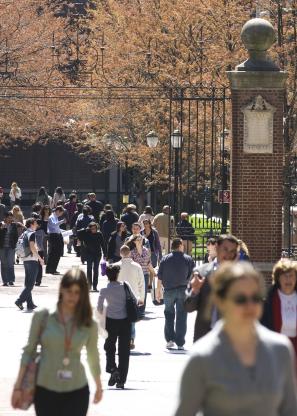
Scope 3 Emissions at Penn (white paper)
Explore the extent of Penn’s main campus' purchased goods and services emissions and opportunities for further investigation.
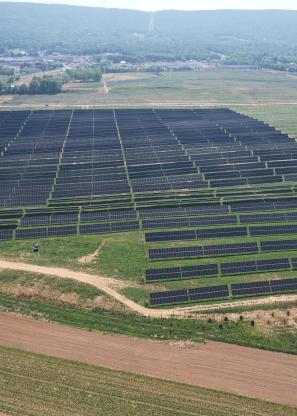
Climate and Sustainability Action Plan 3.0 (CSAP 3.0) FY20-24 Summary Report
Emissions Category Definitions
- Refrigerants & Chemicals: Greenhouse gas emissions from the use of refrigerants in cooling systems and other chemicals used in campus operations. These emissions are tracked due to their significant global warming potential.
- Fertilizer & Animals: Emissions produced from the use of synthetic or organic fertilizers on campus grounds and methane emissions from animals housed on campus for research, education, or other purposes.
- Direct Transportation: Emissions from vehicles owned and operated by the University, including shuttles, buses, and other fleet vehicles that rely on fossil fuels.
- Other On-Campus Stationary: Emissions from fuel combustion of natural gas in on-campus equipment and facilities, such as emergency generators, boilers, pottery kilns, and gas fireplaces that are not classified under other categories.
- Electricity - Chilled Water: Scope 2 emissions from electricity generated off-site and purchased by the University to power chilled water plants that provide cooling to campus buildings.
- Steam - Chilled Water: Scope 2 emissions from the use of steam produced by external providers, specifically used for steam in chilled water systems to cool campus buildings.
- Purchased Steam: Scope 2 emissions from the use of steam produced by external providers and used for heating and other operations on campus.
- Purchased Electricity: Scope 2 emissions from electricity generated off-site and purchased by the University to power campus facilities and infrastructure.
- Directly Financed Air Travel: Emissions resulting from air travel funded by the University for business or academic purposes. These emissions are part of Scope 3 and include flights taken by faculty, staff, and students for University-related activities.
- Faculty Commuting: Emissions generated by the transportation of faculty and staff members traveling to and from campus for work. This category falls under Scope 3 and includes various modes of commuting, such as personal vehicles, public transit, and biking.
- Solid Waste: Emissions resulting from the treatment and disposal of campus-generated waste, including landfilling, incineration, and composting processes.
For additional definitions on all scope 3 emissions, refer to the Greenhouse Gas Protocol's Technical Guidance for Calculating Scope 3 Emissions.
FAQs
Yes. In 2009, Penn announced its goal of achieving carbon neutrality by 2042, referred to as the 100% by 42 goal. Through initiatives like energy efficiency, building recommissioning, carbon offsets, and leveraging a cleaner electricity grid, Penn has made significant strides toward this goal. By the end of FY23, Penn had reduced its gross emissions by 46% compared to the FY09 baseline.
No. The Scope 3 emissions associated with the University's endowment are not included in the campus carbon footprint. However, the Office of Investments has committed to achieving net zero greenhouse gas emissions for Penn’s endowment investments by 2050. For more information, visit the University's Climate Investments webpage.
You don’t need to request access, you already have it. As part of Penn’s commitment to transparency, the greenhouse gas inventory and annual updates are published publicly in line with the University’s membership in Second Nature's Climate Leadership Network.
You can download data directly from the dashboard using the icons in the bottom-right corner of the figures. For some datasets, you may need to click on the specific visualization to activate the download option. The same data is also available on SIMAP®.
Not all Scope 3 emissions are currently measured or reported, but many are included. Scope 3 emissions, which encompass a wide range of indirect emissions, are often complex and challenging to quantify. Scope 3 categories such as air travel, faculty commuting, and refrigerants and chemicals are already included in Penn’s footprint. The University is actively working to expand its Scope 3 reporting and incorporate additional categories as methodologies and data collection improve.
Penn is on track to achieve significant greenhouse gas emissions reductions in line with its 100% by 2042 goal. As of FY24, overall emissions have been reduced by 47% compared to the FY09 baseline. However, like other institutions, Penn faces challenges such as supply chain disruptions, labor market constraints in construction, and operational complexities. While these factors may affect the pace of progress, Penn remains committed to pursuing ambitious targets and continuously elevating its sustainability efforts to meet or exceed its goals.
Penn’s path to carbon neutrality involves a multi-faceted approach that includes:
- Solar Power Purchase Agreement (PPA): Sourcing renewable energy through long-term agreements to reduce dependence on fossil fuels.
- Building Recommissioning and Renovations: Improving energy efficiency in existing infrastructure through upgrades, retrofits, and recommissioning.
- Cleaner Electricity Grid: Benefiting from and contributing to regional efforts to transition the energy grid to renewable and low-carbon sources.
- Offsets: Using high-quality carbon offsets, including for emissions from air travel, to neutralize emissions that cannot currently be eliminated.
While these strategies alone cannot fully achieve carbon neutrality without the aid of offsets, Penn recognizes that innovation, ambition, and future advancements in technology will play a critical role in meeting its long-term goals. The University is committed to staying adaptable and embracing new opportunities for sustainability.
Civic Sustainability Fellowship
Penn’s Civic Sustainability Fellowship is open to both undergraduate and graduate students at Penn. This eleven-week summer program aims to support the City’s regional, sustainability objectives and provide professional development and real-world learning opportunities to Penn students by placing research interns in summer positions with city agencies and non-profit organizations. Selected organizations are dedicated to sustainability and social equity.
Fellowship Placements: Civic Sustainability Fellows are matched with organizations from across the region. Such locations have included:
- City of Philadelphia’s Office of Sustainability
- Philadelphia Energy Authority
- Solarize Philly
- Philadelphia Green Capital Corp
- The School District of Philadelphia
- UC Green
Fellows work closely with these organizations to develop specific outcomes and goals for their internship projects. If you are a local organization interested in hosting a summer fellow, contact our office.
Requirements: To be eligible for this internship, applicants should have familiarity with sustainability issues, strong writing and communication skills, project management capabilities, and knowledge of environmental sustainability topics such as energy efficiency, waste and recycling, transportation, stormwater management, or urban greening. Previous experience working with diverse stakeholders is also preferred.
Job Duties: Fellows collaborate with project partners to define objectives and anticipated outcomes for their summer projects and are responsible for implementing specific projects and initiatives as directed by their project partners. Additionally, they are expected to measure and evaluate the success of their projects and provide recommendations for future improvements. Each fellow will present their work to the Penn Sustainability Office, their project partner, and other stakeholders at the end of the summer term.
Internship Details: The program offers three to four paid positions every summer and is 30 hours of work per week. The fellowship period spans the academic summer term and all work is completed in-person. Applications open in February and are accepted and reviewed on a rolling basis. Preference is given to applicants who are eligible for work-study opportunities. Find summer 2025 opportunities HERE.
Overall, the Penn Civic Sustainability Fellows program offers a unique opportunity for Penn students to gain hands-on experience in sustainability-focused roles within city agencies and non-profit organizations. It aligns with the city's sustainability objectives while fostering professional growth and community engagement among the interns.
This summer fellowship matches Penn undergraduate and graduate students with local organizations advancing sustainability in their communities.

Help advance the City’s regional sustainability objectives and provide professional development and real-world learning opportunities to Penn students.
Three applicants are selected each spring to support a local organization for the academic summer term. Application open in early spring. Find summer 2025 opportunities HERE.
Bird-Friendly Buildings
Bird-Friendly Buildings Map
Sustainability Coordinators
The Sustainability Coordinators are departmental roles that support the University's Climate and Sustainability Action Plan.
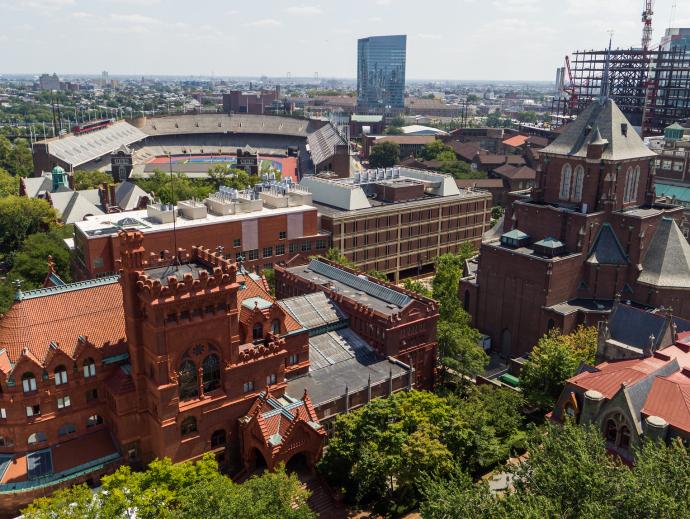
The Sustainability Coordinators are a collaborative group of campus leaders representing Penn’s Schools and Centers that strive to implement significant operational and behavior changes to support the University’s Climate and Sustainability Action Plan 4.0 and drive a shift to carbon neutrality.
The Sustainability Coordinators act as a bridge to Penn’s senior leadership through the use of interdisciplinary, data-driven best practices and communicating accomplishments within their respective areas of campus.
Sustainability Coordinators attend monthly group meetings, lead their School’s participation in seasonal awareness campaigns, recruit members to the Penn Employee Alliance for Climate & the Environment (PEACE), and help to identify offices to participate in the Green Office program and labs to participate in the Green Labs program.